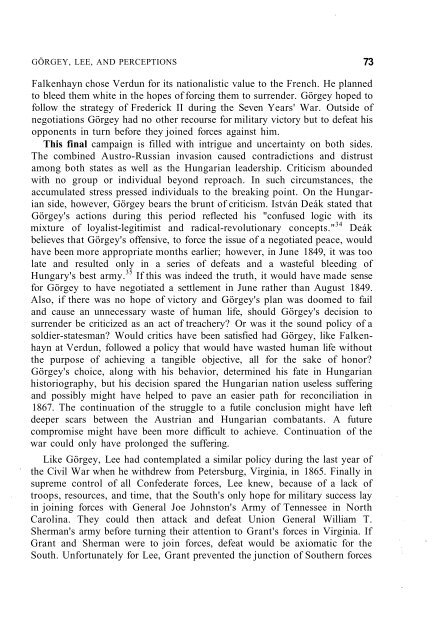HUNGARIAN STUDIES 11. No. 1. Nemzetközi Magyar ... - EPA
HUNGARIAN STUDIES 11. No. 1. Nemzetközi Magyar ... - EPA
HUNGARIAN STUDIES 11. No. 1. Nemzetközi Magyar ... - EPA
- No tags were found...
You also want an ePaper? Increase the reach of your titles
YUMPU automatically turns print PDFs into web optimized ePapers that Google loves.
GÖRGEY, LEE, AND PERCEPTIONS 73Falkenhayn chose Verdun for its nationalistic value to the French. He plannedto bleed them white in the hopes of forcing them to surrender. Görgey hoped tofollow the strategy of Frederick II during the Seven Years' War. Outside ofnegotiations Görgey had no other recourse for military victory but to defeat hisopponents in turn before they joined forces against him.This final campaign is filled with intrigue and uncertainty on both sides.The combined Austro-Russian invasion caused contradictions and distrustamong both states as well as the Hungarian leadership. Criticism aboundedwith no group or individual beyond reproach. In such circumstances, theaccumulated stress pressed individuals to the breaking point. On the Hungarianside, however, Görgey bears the brunt of criticism. István Deák stated thatGörgey's actions during this period reflected his "confused logic with itsmixture of loyalist-legitimist and radical-revolutionary concepts." 34 Deákbelieves that Görgey's offensive, to force the issue of a negotiated peace, wouldhave been more appropriate months earlier; however, in June 1849, it was toolate and resulted only in a series of defeats and a wasteful bleeding ofHungary's best army. 35 If this was indeed the truth, it would have made sensefor Görgey to have negotiated a settlement in June rather than August 1849.Also, if there was no hope of victory and Görgey's plan was doomed to failand cause an unnecessary waste of human life, should Görgey's decision tosurrender be criticized as an act of treachery? Or was it the sound policy of asoldier-statesman? Would critics have been satisfied had Görgey, like Falkenhaynat Verdun, followed a policy that would have wasted human life withoutthe purpose of achieving a tangible objective, all for the sake of honor?Görgey's choice, along with his behavior, determined his fate in Hungarianhistoriography, but his decision spared the Hungarian nation useless sufferingand possibly might have helped to pave an easier path for reconciliation in1867. The continuation of the struggle to a futile conclusion might have leftdeeper scars between the Austrian and Hungarian combatants. A futurecompromise might have been more difficult to achieve. Continuation of thewar could only have prolonged the suffering.Like Görgey, Lee had contemplated a similar policy during the last year ofthe Civil War when he withdrew from Petersburg, Virginia, in 1865. Finally insupreme control of all Confederate forces, Lee knew, because of a lack oftroops, resources, and time, that the South's only hope for military success layin joining forces with General Joe Johnston's Army of Tennessee in <strong>No</strong>rthCarolina. They could then attack and defeat Union General William T.Sherman's army before turning their attention to Grant's forces in Virginia. IfGrant and Sherman were to join forces, defeat would be axiomatic for theSouth. Unfortunately for Lee, Grant prevented the junction of Southern forces
















